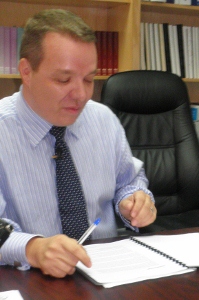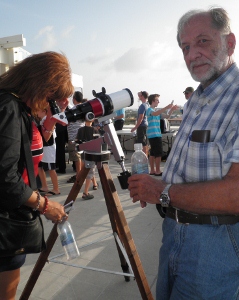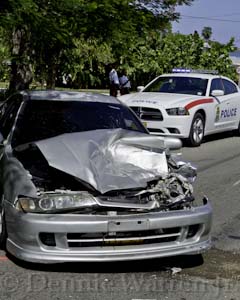Archive for June, 2012

UN sends warning ahead of Rio summit
 (Reuters): Population growth, urbanisation and consumption are set to inflict irreversible damage on the planet, the United Nations said on Wednesday, and called for urgent agreement on new green targets to save the environment. The U.N. Environment Programme sounded the alarm in its fifth Global Environment Outlook (GEO-5) report, published two weeks before the Rio+20 summit in Brazil, one of the biggest environment meetings in years. Time was running very short, U.N. Under-Secretary General and UNEP Executive Director Achim Steiner said, as the planet heads for 9 billion people by 2050 and the global economy consumes ever larger amounts of natural resources.
(Reuters): Population growth, urbanisation and consumption are set to inflict irreversible damage on the planet, the United Nations said on Wednesday, and called for urgent agreement on new green targets to save the environment. The U.N. Environment Programme sounded the alarm in its fifth Global Environment Outlook (GEO-5) report, published two weeks before the Rio+20 summit in Brazil, one of the biggest environment meetings in years. Time was running very short, U.N. Under-Secretary General and UNEP Executive Director Achim Steiner said, as the planet heads for 9 billion people by 2050 and the global economy consumes ever larger amounts of natural resources.
"If current trends continue, if current patterns of production and consumption of natural resources prevail and cannot be reversed and 'decoupled', then governments will preside over unprecedented levels of damage and degradation," Steiner said in a statement.
Of the 90 most important environmental goals in existence, only four are making significant progress.

Public should be concerned
 (CNS): The auditor general has said that the public needs to be concerned about how government is spending and managing public money. Following the release of another report highlighting continued weaknesses in how government looks after the public purse, Alastair Swarbrick said government has a duty to have proper stewardship over public finances and the people need to pay attention to how their money is being managed. Ahead of several more reports expected over the next two months, the auditor general encouraged the public to pay close attention to how its money was being looked after.
(CNS): The auditor general has said that the public needs to be concerned about how government is spending and managing public money. Following the release of another report highlighting continued weaknesses in how government looks after the public purse, Alastair Swarbrick said government has a duty to have proper stewardship over public finances and the people need to pay attention to how their money is being managed. Ahead of several more reports expected over the next two months, the auditor general encouraged the public to pay close attention to how its money was being looked after.
“I think the public should be concerned about these issues. It is their money at the end of the day, however it is collected and whatever coercive revenues it is incurred through,” Swarbrick said Tuesday, as he published his latest report revealing continued risks of abuse of the government’s fuel card system GASBOY.
“They should be looking for the government to get as much value as possible from that money,” the auditor general said, referring to public coffers. “It should be directed at appropriate things, the right things and not used for inappropriate activities. It should be of very significant concern to the public if there is a risk of potential abuse of the system.”
Swarbrick said his reports were not about “picking on” or “harassing” government but it was his job to hold government to account for its use of public funds.
“We want to help government move forward and improve but at the end of the day my ultimate goal is to hold them to account to the Legislative Assembly and there unto the public. The government has a responsibility to have effective proper stewardship of those funds. It is public money, not their money, and they have the responsibility to use that money appropriately in line with good principles."
He said that it was the controls in place that would prevent the system from being abused. A common theme in most of Swarbrick’s and his predecessor’s reports is the failure of leadership in government to oversee and control systems relating to how money is spent.
The audit office is one of the few checks and balances on how government spends the half billion dollars it collects from the people each year but Swarbrick also pointed to the work of the internal audit unit.
This department also examines weaknesses and vulnerability to fraud, abuse or mismanagement in public spending, which he said should be utilised by public service management. He said the unit’s findings were a useful tool to identify potential weaknesses and point to ways things could be improved, but government is not making good use of that tool.
The internal audit unit does not regularly publish its audits, though it has released some under Freedom of information requests. Their work often only comes to light as a result of the auditor general taking up the unit's findings.
With serious weaknesses and potential fraud and abuse by government being revealed in the last three reports, the next report on how government deals with capital projects is also likely to reveal further failings.
Swarbrick said that in the next report due at the end of this month his office has used the school projects and the new government building as case studies to measure how well government deals with major public sector developments.
Following that the office will be releasing the first two of four reports examining government spending in general which will examine more closely what are believed to be widespread weaknesses and vulnerabilities across the entire public sector.
The auditor is also hoping to publish an update on public sector financial reporting and details on where government is on the promised consolidated accounts for the 2010/11 financial year.

Pawn shop robber faces charges for immitation gun
 (CNS): A 20-year-old man appeared in court Wednesday and was remanded in custody to Northward prison in connection with the Cash-Wiz robbery in Bodden Town last week. Police charged the man with possession of an imitation firearm with intent to commit an offence, affray and common assault. The man had been apprehended by unarmed officers outside the store which he had been attempting to rob. The attempted pawn shop hold-up happened at 1:30 in the afternoon last Thursday and police were alerted as the robbery was in progress. When police arrived the man was running from the store and he threatened the unarmed officers with the weapon which was later discovered to be an imitation gun.
(CNS): A 20-year-old man appeared in court Wednesday and was remanded in custody to Northward prison in connection with the Cash-Wiz robbery in Bodden Town last week. Police charged the man with possession of an imitation firearm with intent to commit an offence, affray and common assault. The man had been apprehended by unarmed officers outside the store which he had been attempting to rob. The attempted pawn shop hold-up happened at 1:30 in the afternoon last Thursday and police were alerted as the robbery was in progress. When police arrived the man was running from the store and he threatened the unarmed officers with the weapon which was later discovered to be an imitation gun.
Acting Superintendent Robert Scotland described the actions of the officers who confronted the robbery suspect as nothing short of heroic as they were unaware that the firearm was not real.
“They were threatened by an armed suspect and without thinking of their own safety and wellbeing they moved in quickly to ensure that he was arrested and could not harm any members of the public,” the senior officer said. “Fortunately the gun has been confirmed as an imitation – but the officers did not know that at the time. Their actions are testament to the dedication of our staff to do all that they can to keep these islands safe from those who would threaten that safety through the criminal use of firearms,” Scotland added.

Venus transit draws hundreds to roof top viewing
 (CNS): Hundreds of people young and old queued around Camana Bay Tuesday evening in order to get a glimpse of the once in a lifetime transit of the planet Venus across the face of the sun. The viewing event onthe rooftop of 62 Forum Lane was organised by the Cayman Islands Astronomical Society (CIAS) and marked its 21st anniversary. Local stargazers were also involved in a worldwide experiment to time the two points when Venus started and finished its journey across the face of the Sun, which took around seven hours.
(CNS): Hundreds of people young and old queued around Camana Bay Tuesday evening in order to get a glimpse of the once in a lifetime transit of the planet Venus across the face of the sun. The viewing event onthe rooftop of 62 Forum Lane was organised by the Cayman Islands Astronomical Society (CIAS) and marked its 21st anniversary. Local stargazers were also involved in a worldwide experiment to time the two points when Venus started and finished its journey across the face of the Sun, which took around seven hours.
Most of the 1,000 or so visitors, however, were just happy to get chance to glimpse the rare planetary event and watch Earth’s near neighbour pass the Sun safely with the help of special viewing glasses and telescopes.
The planet was visible in Cayman for around two hours during the early part of its transit until the Sun set around 7pm. Anyone who missed it missed the opportunity of a lifetime as the second planet from the Sun won’t make this journey for another 105 years.
Transits of Venus occur in pairs separated by eight years. Each pair is in turn separated by an alternating interval of 105.5 and 121.5 years, making a cycle of 243 years. The last transit of Venus was in June 2004, when modern instruments gave the best views ever, and the next transit of Venus will not be seen from Earth until 2117.
 Astronomers around the world used the latest technology to document the transit and NASA captured some amazing pictures of rare spectacle. A high definition short video can be viewed here.
Astronomers around the world used the latest technology to document the transit and NASA captured some amazing pictures of rare spectacle. A high definition short video can be viewed here.
For more information on Cayman’s own astrological society and how to join contact chris.cooke@gov.ky or visit Facebook.com/ Cayman Islands Astronomical Society.

Cops back judge on DUI limit
 (CNS): With more than a dozen fatalities on Cayman’s roads over the last five years where alcohol was a factor, the call by Justice Richard Williams to lower the legal alcohol limit and bring the jurisdiction in line with other countries has been welcomed by the police. In recent months the RCIPS has been clamping down on drinking and driving, which senior officers have frequently described as endemic. One glance at the traffic listings in the local Summary Court on any day gives an idea of the numbers of DUI charges being brought. On Wednesday alone close to 50% of the cases involved alcohol and police say action is required to make the roads safer.
(CNS): With more than a dozen fatalities on Cayman’s roads over the last five years where alcohol was a factor, the call by Justice Richard Williams to lower the legal alcohol limit and bring the jurisdiction in line with other countries has been welcomed by the police. In recent months the RCIPS has been clamping down on drinking and driving, which senior officers have frequently described as endemic. One glance at the traffic listings in the local Summary Court on any day gives an idea of the numbers of DUI charges being brought. On Wednesday alone close to 50% of the cases involved alcohol and police say action is required to make the roads safer.
Last Thursday during his sentencing ruling in a death by dangerous driving case Justice Williams pointed out that, while the UK had a legal limit of 80mgs per 100mls of blood and other European countries were as low as 50mgs, Cayman has one of the highest legal limits in the world with 100mgs of alcohol in 100mls of blood. The judge said he believed the time had come for Cayman to review the level at which the legal limit was set.
Scientific evidence points to the fact that a driver’s concentration begins to be effected with as little as 40mgs of alcohol in 100mls of blood. This means people are being permitted to drive legally on Cayman’s roads with alcohol levels double the point of where concentration begins to lapse.
The police told CNS that the RCIPS was fully supportive of the judge’s position and there was a need to lower the legal alcohol limit in an effort to try and make Cayman’s road safer.
"We fully support the position of Justice Williams on this matter,” an RCIPS spokesperson said Wednesday. “Any steps that can be taken to reduce road crash injuries and fatalities on our roads must be explored. We have said time and time again that drink driving is endemic on these Islands, and unfortunately, despite the numbers of deaths and injuries on our roads, people still continue to drink then get behind the wheel of their vehicles, endangering themselves and innocent road users. It's clear that we need much tighter legislation to help us make the roads of Cayman safer for all."
Although the judge’s call to lower the limit received public support on the CNS blog Monday, the major concern in numerous comments relating to a drinking and driving was the lack of an alternative to the private car. Bloggers said that drivers are getting in their cars after drinking alcohol because taxis are too expensive and there is no public transport at all after dark. Among the more than fifty comments posted in response to the story, bloggers called for a comprehensive review of public transport and the introduction of a regulated bus, taxi and ferry services.
See related story: Judge: DUI limit too high
Vote in CNS poll: What is the main cause of drinking and driving in the Cayman Islands?

Cayman removed from Philippines worker’s black list
 (CNS): The Cayman Islands has finally been removed from the Philippines government’s workers black list after what officials described as “diplomatic negotiations involving many communiqués and two visits” to Cayman by representatives from the Asian country. Cayman was placed on the black list last November and listed as a country which Nationals from the Philippines were banned from working because of a failure to protect Filipino workers here. Local government officials said Cayman had been placed on this list “erroneously” by the Filipino Overseas Employment Administration which believed the jurisdiction did not have sufficient safeguards in place to protect the rights of migrant workers.
(CNS): The Cayman Islands has finally been removed from the Philippines government’s workers black list after what officials described as “diplomatic negotiations involving many communiqués and two visits” to Cayman by representatives from the Asian country. Cayman was placed on the black list last November and listed as a country which Nationals from the Philippines were banned from working because of a failure to protect Filipino workers here. Local government officials said Cayman had been placed on this list “erroneously” by the Filipino Overseas Employment Administration which believed the jurisdiction did not have sufficient safeguards in place to protect the rights of migrant workers.
A local effort to reverse the decision involved the Deputy Governor’s Office and the Attorney General as well as the British Embassy in Manila working with the Philippine government on the matter, on behalf of the Governor’s Office.
On 22 May 2012, official said Wednesday that the government of the Philippines had confirmed that the Cayman Islands have been compliant in safeguarding the rights of immigrant workers. Thirty other countries (including Egypt, India, Nicaragua, and the Turks and Caicos) engaged in similar processes, and have also been removed from the list.
Welcoming the announcement, Cayman Islands’ Deputy Governor Franz Manderson said, “Filipino nationals constitute the second-largest group of expatriate workers, which should indicate that the government and people of the Cayman Islands are indeed very welcoming of them – as we are of the more than 100 other nationalities which live and work in harmony in these Islands.”
Manderson also praised the efforts of all those involved in collating and providing the evidence to confirm Cayman’s compliance regime.
Samuel Bulgin said government was delighted Cayman had been removed from the list of non-compliant countries which he believed was been premature, and could have been avoided if the appropriate consultation had taken place before the list was issued.
Art Ursua, the Cayman Islands’ unofficial consul for the Philippines, also welcomed the acknowledgment that these Islands are in compliance with the protection guarantees listed under the Department of Foreign Affairs.
There are currently 2620 people from the Philippines on work permits in the Cayman Islands according to the latest quarterly report from the immigration department, representing 13% of the migrant workforce. As Filipino workers have been migrating to Cayman for many years, growing numbers are also becoming permanent residents and status holders extending ties between the two countries.

Prep student selected for UWC 2012 scholarship
 (CNS): Madeleine Rowell will be attending the United World College campus school in Montezuma, New Mexico, on a full scholarship, having been selected by the UWC Cayman Islands national committee as its 2012 scholarship recipient. Rowell will be graduating from Cayman Prep and High School this year and at the UWC-USA school she will study for the International Baccalaureate diploma. Along with excellent scholastic abilities, she is also actively involved in community services, such as Key Club and volunteering at the Humane Society and the Pines. UWC Cayman Islands Chairperson Tara Rivers said, “As with most years, this year we had a very impressive set of applicants for the UWC Cayman Islands scholarship.
(CNS): Madeleine Rowell will be attending the United World College campus school in Montezuma, New Mexico, on a full scholarship, having been selected by the UWC Cayman Islands national committee as its 2012 scholarship recipient. Rowell will be graduating from Cayman Prep and High School this year and at the UWC-USA school she will study for the International Baccalaureate diploma. Along with excellent scholastic abilities, she is also actively involved in community services, such as Key Club and volunteering at the Humane Society and the Pines. UWC Cayman Islands Chairperson Tara Rivers said, “As with most years, this year we had a very impressive set of applicants for the UWC Cayman Islands scholarship.
"The selection committee was quite impressed with the shortlisted candidates, and it made our decision a tough one. That said, I believe Madeleine will do an excellent job representing the Cayman Islands at UWC-USA and I wish her all the best as she embarks on this new, challenging and wonderful experience!”
Rowell will be joining fellow UWC Cayman Islands scholar Zachary Jones at UWC-USA, who has just completed his first year of the two-year IB Diploma programme. Jones, one of the scholarship recipients from 2011, attended the Layman E. Scott Sr. High School prior to his departure. Kathryn Schirn and Abi Drummond, the other two 2011 scholarship recipients, are currently attending UWC Costa Rica and Atlantic College in Wales, respectively.
UWC Cayman Islands is also celebrating the recent graduation of its newest alumni, Hailee Robinson and Kelsey Dixon, who attended UWC-USA and UWC Costa Rica, respectively. Robinson will be attending McGill University in Montreal this fall, and Dixon will be attending the University of British Columbia following a year working for Deloitte in Cayman.
In regards to her selection, Rowell was elated and is very much looking forward to the opportunity. She stated, “I am eternally grateful to my sponsors and members of the CIUWC admission committee, who have put in great effort to make this happen. I will take advantage of every opportunity that is opened up to me through my UWC experience. I am thrilled to become part of the UWC movement, and join this worldwide community of people who share my ideals.”
UWC Cayman Islands is committed to providing full scholarship to promising Caymanian students to attend one of thirteen UWC campuses across the world. It relies upon fundraising as well as private and corporate donations to meet that goal. Rivers extended her gratitude, stating, “I would like to thank our sponsors and corporate donors because, without you, UWC Cayman Islands would not be able to send our very talented, well rounded and bright young people to attend the various UWCs year after year.
"I also encourage businesses and interested individuals to become a part of this exciting and life-changing movement by giving a donation, however large or small it may be, in order for us to help to promote the UWC mission to make education a force to unite people, nations and cultures for peace and a sustainable future.”
Companies and individuals interested in making a donation to UWC Cayman Islands are invited to contact Rivers at CIUWCFoundation@yahoo.com.
The recruitment process for UWC scholars begins in January and February when UWC Cayman Islands representatives visit secondary schools across Grand Cayman and Cayman Brac to give presentations about the UWC movement and the local application process. Eligible students must also be 16 by the time they attend UWC.
Written applications are due at the beginning of March and the Selection Committee, which is made of mostly of UWC alumni, reviews each application. Particular consideration is given to academic achievement, extracurricular involvement, community service and a passion for the UWC mission and values, and up to twelve applicants are selected for an individual interview.
Following individual interview the top five or six applicants move on to a group stage, where participants discuss important local and international issues and interact with each other through team building exercises or group projects.
After this final stage the scholar or scholars for that year is/are chosen to represent the Cayman Islands at one of twelve UWC colleges. (There are technically thirteen UWC colleges; however, the campus in Venezuela is an agricultural school intended for non-traditional students.)
Also of note is that students apply to UWC through whichever national committee that corresponds to their nationality. UWC Cayman Islands only considers Cayman students for selection and refer non-Caymanian students to apply through their own national committee as necessary.
For more information visit www.uwc.org.

CEC in talks with more than 100 firms
 (CNS Business): Although there is still no date for the start of construction on the Cayman Enterprise City (CEC) development, representatives from Cayman’s first special economic zone (SEZ) say it is attracting attention from around the world and they are in talks with more than 100 international firms. Hilary Cahill, VP of marketing and business development for CEC, told CNS Business that there are eight companies already established in the zone, with another nine going through the licencing process. However, another 124 international companies are currently in various stages of negotiation to register in the special techy economic zone, she said. Read more on CNSBusiness
(CNS Business): Although there is still no date for the start of construction on the Cayman Enterprise City (CEC) development, representatives from Cayman’s first special economic zone (SEZ) say it is attracting attention from around the world and they are in talks with more than 100 international firms. Hilary Cahill, VP of marketing and business development for CEC, told CNS Business that there are eight companies already established in the zone, with another nine going through the licencing process. However, another 124 international companies are currently in various stages of negotiation to register in the special techy economic zone, she said. Read more on CNSBusiness

A lost opportunity?
The proponents of closing a portion of the West Bay Road have closed their eyes to the great opportunity that theextension of the Esterley Tibbetts Highway brings. I have never been directly involved in the tourism sector of our economy but over many years I have read and heard from those involved that our tourism product needs to be improved. This ETH extension would allow a significant improvement in my opinion.
We have a development company that apparently intends to develop multiple hotel properties. It is claimed that these properties will need direct “beach frontage” to be successful.
Other persons have already pointed out that this frontage is in no way any guarantee of success, as seen by the struggles of existing hotels, that are on much, much better direct beach frontage. This company also does not wish to wait for some future government to possibly extend the ETH through their land, thereby creating even more opportunities for the developer.
(As a side note, query whether the land for the road corridor should actually cost a future government anything because often the increase in the adjacent land value will compensate for the appropriation of the corridor, making it a win-win process.)
Once the ETH extension is complete the volume of traffic on WBR will drop significantly. This is the start of the opportunity. The reduction of the maximum speed on WBR to 25mph, which has been talked about for quite some time, would be the next step and drop the traffic volume further. This would then create a zone along the entire western side of the island, where our very valuable tourism clientele can live/play/visit in a family friendly environment.
The existing WBR can gradually be converted into an “avenue” with more shade — and colour — providing flora (maybe in sections of the existing middle lane), and with pedestrian crossing zones with lights or even lower speeds in high volume areas, and traffic-calming measures to automatically enforce the maximum speed, such as bumps,
as well as cycle lanes.
This would enable our tourism visitors (has anyone really considered the situation from their perspective?) to move about from WB to GT, while visiting all of the included amenities, without ever travelling on a fast multi-lane road where most of them are driving on the “wrong” side. Another benefit would be to have a route conducive to older resident drivers who, quite sensibly, might prefer not to deal with faster multiple lanes of traffic and roundabouts. Plus it leaves the WB/GT alternate route, which was always envisioned since SMB development began, in case of problems on the new main route.
This change of WBR use will also promote some increase of development on the east side of WBR. Potential developers would likely be more willing to invest since the guests of their properties would only have to deal with limited, slow-moving traffic for beach access, as would the hotels by the current development company.
Additional (light-controlled) pedestrian crossings could be added as incentives for new properties as needed. Local companies would also be able to offer new/more outdoor/healthy activities, such as bicycle/segway/walking tours, and the tour/water sports/taxi/bus transport companies could move around collecting customers in a smoother and safer environment.
Close your eyes and imagine some future tourists renting electric bicycles to visit the Turtle Farm or go shopping from a WBR condo/ hotel or even a cruise ship via this scenic avenue without any fear of fast moving traffic.
We are told that the ETH extension is to compensate for the WBR closure. I do not really agree with that scenario as the trade is not fair (plus additional issues brought up by others). If the closure proceeds, the country will forever have closed the door to the opportunites I have described.
Vehicular traffic will always have to use the ETH to get around this closed section and the idea of speed reduction on WBR loses its effect, especially if other developmentsrequest that same agreement. The properties on the closed section(s) will benefit greatly, but that is a selfish proposal when compared to the longer term benefits for sustaining/improving our overall tourism product.
The persons who should be heard from on this subject are the owners of the hotel/condominium/tour/water sports/restaurant/retail businesses that operate in this area. Let us hear if they consider that this closure proposal has any benefits to their existing or future product offering. What do they see happening to their business activity (in the non-closure areas) over the next 20 years if this proposal continues?
Development benefits are greatly desired but should not be restricted in their focus. They should be for the long term benefit of the entire country.

Verdict on teen murder suspect set for Friday
(CNS): Justice Alex Henderson said he will deliver his verdict in the crown’s case against 18 year old Chakane Scott on Friday 8 June, after the prosecuting and defence attorneys finished their closing statements Tuesday. The judge is hearing the case alone in which the crown says the East End teenager shot and killed his friend Asher McGaw (21) last September. The case depends almost entirely on the evidence of 17 year old Antascio Rankine who says he was with both McGaw and Scott in the early morning hours when his best friend was killed and points the finger at Scott. However, the defence says Rankine is an unreliable witness making a false accusation against Scott.
Although the teenage defendant gave a no comment interview to police on his arrest and retained his silence during the trial offering no evidence in his defence, his attorney Sasha Wass QC told the court Tuesday that her client was not there when McGaw was shot multiple times in John McLean drive.
She said the crown’s case rested solely on the evidence of one witness which was “riddled with doubt” and was not a witness “worthy of belief” as she disputed the crown’s claims of corroborating evidence from the pathologist andother civilian witnesses.
Despite discussion on the law regarding the silence of a suspect under the new police legislation Wass reminded the judge that he could not find here client guilty just because he had not given evidence as the right to silence still remained.
Wass said that Rankine’s accusation came as a result of the way the police handled the teenager when he was asked to make a statement. She said that in his first statement Rankine had denied knowing anything about the murder of his friend but was persuaded to make another statement by police after a senior officer said he believed he was hiding something. Wass said that Rankine told the police what he thought they wanted to hear in his second statement. “We say he has fabricated his evidence,” she added.
The QC said there were a number of significant doubts about Rankine’s account of the murder as well as no explanation for some other 23 injuries that McGaw had sustained just before he died. She also raised questions about how Scott could have concealed the gun used in the murder, given what he was wearing on the night in question.
Wass also suggested that in his account to the police Rankine may have woven elements of truth into a false accusation. “There is no certainty and no support for Rankine’s evidence,” she said adding that the crown had been unable to prove who pulled the trigger. “On the critical issue of who pulled the trigger there is no evidence at all supporting,” his account.
The crown had given no motive for Scott to kill McGaw during the trial which Wass admitted was not required but as the two men were friends while there were others who did have motive to kill McGaw as a result of gang rivalries between the East End youngsters and those in Bodden Town.
Wass also pointed to the teenage witness’s failure to call 911 after he said he had seen his friend gunned down. She said while it may have been plausible that he did not go to assist McGaw after he was killed but at the very least he could have called the emergency services. “He left his friend to die in the street,” the QC accused.
“The case is riddled with doubt and uncertainty, based on an unbelievable witness who changed his story at the behest of the police,” Wass told the court, as she added that finding her client guilty the court would be convicting on wholly unreliable evidence.
The crown contended that Rankine had no motive to lie and was by accusing Scott who had threatened him to keep quiet, a threat overheard by another witness, taking a great risk.
Trevor Ward senior crown council said there was corroborating evidence for Rankine’s account from the pathologist and civilian witnesses who had seen the three men together less than an hour before the shooting. He said that Rankine had no motive to falsely accuse the defendant as they too had been friends and there was no evidence that they had fallen out.
“Rankine gives a truthful account in circumstances where he did not haveto come forward,” crown counsel noted. Ward noted that Rankine was not a suspect at the time and the police did not know he knew anything of the crime until he gave an account. The prosecutor said that be giving his account he placed himself in the middle of a murder case in which he too could have become a suspect.
“The reason why he did so was because he is being truthful and witnessed his best friend being shot by the defendant,” the crown’s attorney stated to the court.